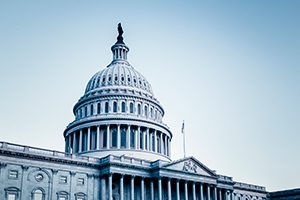House Passes Bipartisan Retirement Savings Bill
 On March 29, the U.S. House of Representatives passed H.R. 2954, the Securing a Strong Retirement Act of 2021, by an overwhelmingly bipartisan vote of 414-5. The bill includes many provisions to boost individual retirement savings and expand coverage to better access retirement savings programs.
On March 29, the U.S. House of Representatives passed H.R. 2954, the Securing a Strong Retirement Act of 2021, by an overwhelmingly bipartisan vote of 414-5. The bill includes many provisions to boost individual retirement savings and expand coverage to better access retirement savings programs.
The bill includes several provisions that would impact employer-sponsored retirement programs. Notably, the bill would make enrollment in newly created 401(k) and 403(b) plans mandatory for eligible employees beginning in 2024. Employers with 10 or fewer employees or those that have been in business for fewer than three years would be exempt from this requirement, and employees would be able to opt out of the program. Additionally, the bill requires employers to allow part-time employees to participate in 401(k) plans if they work at least 500 hours per year after two years working for the employer — a decrease from the previously required three years.
The bill will also allow employers to make matching contributions to the 401(k), 403(b) or SIMPLE IRA account of employees who are paying off student loans and do not contribute enough to their accounts to receive a full employer match.
In addition to the provisions related to employer plans, the bill also has provisions for individual workers. The bill allows older workers to make bigger contributions to their retirement accounts than is currently allowed. Specifically, individuals aged 62-64 would be able to contribute an extra $10,000 for 401(k) plans and other programs and $3,000 for SIMPLE plans per year to such accounts beginning in 2024. These “catch-up” contributions would be required to be made after taxes.
The bill now heads to the Senate where it will need to pass with 60 votes to overcome the filibuster. Given the bipartisan support in the House, the bill could receive similar support from both parties, but it is unclear when and how the Senate will vote.
CUPA-HR will keep members apprised as this bill moves through the Senate.


